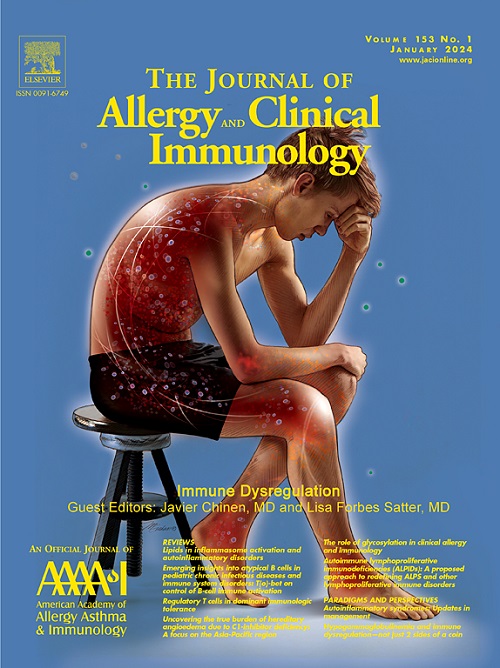Preclinical efficacy of peanut-specific IgG4 antibody therapeutic IGNX001
IF 11.4
1区 医学
Q1 ALLERGY
引用次数: 0
Abstract
Background
Existing therapeutic strategies are challenged by long times to achieve effect and often require frequent administration. Peanut-allergic individuals would benefit from a therapeutic that provides rapid protection against accidental exposure within days of administration while carrying little risk of adverse reactions.
Objective
Guided by the repertoire of human IgE mAbs from allergic individuals, we sought to develop a treatment approach leveraging the known protective effects of allergen-specific IgG4 antibodies.
Methods
We applied our single-cell RNA-sequencing SEQ SIFTER platform (IgGenix, Inc, South San Francisco, Calif) to whole blood samples from peanut-allergic individuals to discover IgE mAbs. These were then class-switched by replacing the IgE constant region with IgG4 while retaining the allergen-specific variable regions. In vitro mast cell activation tests, basophil activation tests, ELISAs, and an in vivo peanut allergy mouse model were used to evaluate the specificity, affinity, and activity of these recombinant IgG4 mAbs.
Results
We determined that human peanut-specific IgE mAbs predominantly target immunodominant epitopes on Ara h 2 and Ara h 6 and that recombinant IgG4 mAbs effectively block these epitopes. IGNX001, a mixture of 2 such high-affinity IgG4 mAbs, provided robust protection against peanut-mediated mast cell activation in vitro as well as against anaphylaxis upon intragastric peanut challenge in a peanut allergy mouse model.
Conclusions
We developed a peanut-specific IgG4 antibody therapeutic with convincing preclinical efficacy starting from a large repertoire of human IgE mAbs from demographically and geographically diverse individuals. These results warrant further clinical investigation of IGNX001 and underscore the opportunity for the application of this therapeutic development strategy in other food and environmental allergies.
花生特异性 IgG4 抗体疗法 IGNX001 的临床前疗效。
背景:现有的治疗策略面临的挑战是需要很长时间才能见效,而且往往需要频繁用药。花生过敏症患者将受益于一种治疗方法,这种方法能在用药后几天内迅速防止意外接触,同时不良反应风险很小:目的:以过敏体质人群的人类 IgE 单克隆抗体 (mAbs) 为指导,我们试图开发一种治疗方法,利用已知的过敏原特异性 IgG4 抗体的保护作用:我们将单细胞 RNA 测序 SEQ SIFTER™ 平台应用于花生过敏者的全血样本,以发现 IgE mAbs。然后,通过用 IgG4 代替 IgE 恒定区,同时保留过敏原特异性可变区,对这些 mAbs 进行了类别转换。体外肥大细胞活化试验(MAT)、嗜碱性粒细胞活化试验(BAT)、酶联免疫吸附试验(ELISA)和体内花生过敏小鼠模型被用来评估这些重组 IgG4 mAbs 的特异性、亲和力和活性:我们确定人类花生特异性 IgE mAbs 主要针对 Ara h 2 和 Ara h 6 上的免疫显性表位,而重组 IgG4 mAbs 能有效阻断这些表位。IGNX001是两种此类高亲和力IgG4 mAbs的混合物,在体外对花生介导的肥大细胞活化以及花生过敏小鼠胃内花生挑战时的过敏性休克提供了强有力的保护:我们从来自不同人口和地域的大量人类单克隆 IgE 抗体中开发出了一种花生特异性 IgG4 抗体疗法,其临床前疗效令人信服。这些结果证明 IGNX001 有必要进行进一步的临床研究,并强调了将这种治疗开发策略应用于其他食物和环境过敏的机会。
本文章由计算机程序翻译,如有差异,请以英文原文为准。
求助全文
约1分钟内获得全文
求助全文
来源期刊
CiteScore
25.90
自引率
7.70%
发文量
1302
审稿时长
38 days
期刊介绍:
The Journal of Allergy and Clinical Immunology is a prestigious publication that features groundbreaking research in the fields of Allergy, Asthma, and Immunology. This influential journal publishes high-impact research papers that explore various topics, including asthma, food allergy, allergic rhinitis, atopic dermatitis, primary immune deficiencies, occupational and environmental allergy, and other allergic and immunologic diseases. The articles not only report on clinical trials and mechanistic studies but also provide insights into novel therapies, underlying mechanisms, and important discoveries that contribute to our understanding of these diseases. By sharing this valuable information, the journal aims to enhance the diagnosis and management of patients in the future.

 求助内容:
求助内容: 应助结果提醒方式:
应助结果提醒方式:


